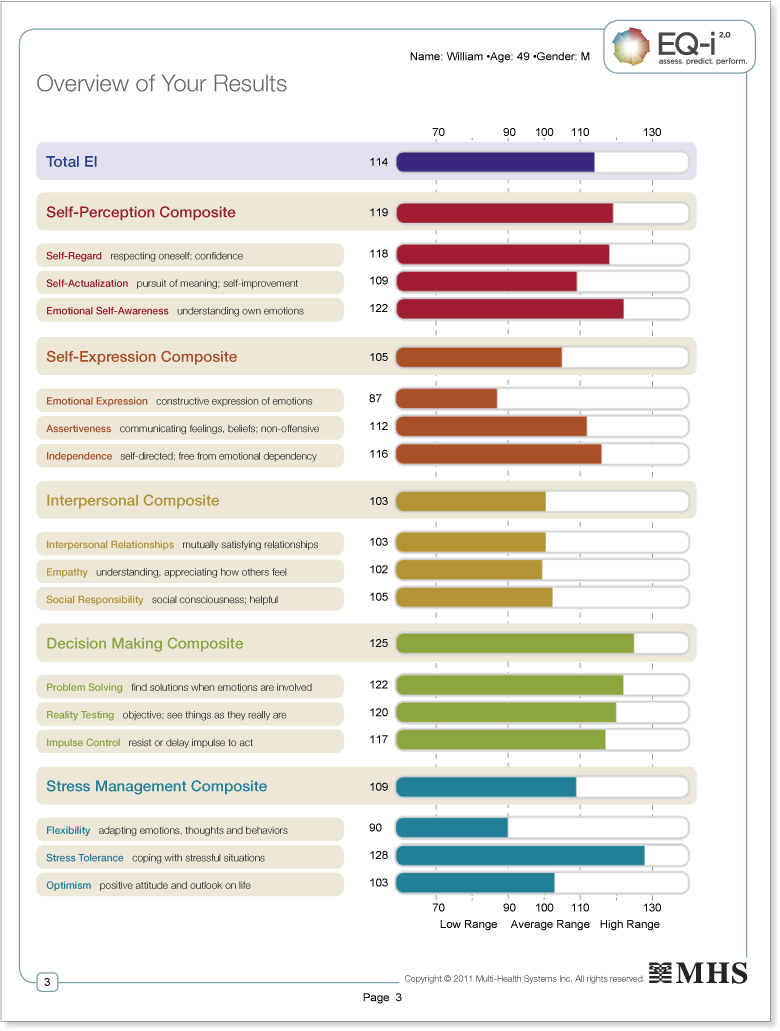Part IV: Using the Results
EQ-i 2.0 Case Studies
Case Study 1
Submitted by: Brett Richards
Client Background
The client is the General Manager (GM) of a high-growth subsidiary of a large organization in the Health Sector. The organization is experiencing tremendous growth and is feeling the effects of that success in terms of resource stretch. It is a fast-paced environment and the whole organization is working long hours to keep up with the work. The client has been very successful at leading smaller niche enterprises with separate P&L’s within larger global organizations for the past 7 years. The client is the type of leader where people gravitate to his integrity and values-based leadership style.
Summary of EQ-i 2.0 Results

The client’s Total EI score (114) is well above the average range and represents a well‑developed overall level of emotional and social functioning. Experience and research has shown that more effective leaders typically possess above-average skills in emotional and social intelligence, which is the case with this client who has proven to be successful in several top leadership positions. While it is helpful to know the overall EI score, it is important to look at the composite and subscales to provide a more nuanced understanding of the unique strengths and areas of potential development for the client.
The five composite scales show enhanced abilities in Decision Making (125), Self-Perception (119), and Stress Management (109), which indicate a strong understanding and ability to monitor the way in which emotions participate in the decision making process. It also indicates an ability to look at decisions objectively, resisting the temptation to act rashly in difficult circumstances. This ability is particularly useful in a stressful, entrepreneurial start-up environment where change is the constant and ambiguity arises on a daily basis. The other composite scales indicate relatively lower scores, although all remain slightly above the average subscales.
A closer look at the subscales indicates a leader who possesses a high degree of confidence (Self-Regard) and self-awareness (Emotional Self-Awareness). He is self-directed (Self-Actualization, Independence) and likely thrives in complex and stressful environments (Stress Tolerance) that require multiple strategic decisions on a regular basis (Problem Solving). This leader is very comfortable with getting his point across while meeting his needs in such a way that preserves rather than damages relationships (Assertiveness and Interpersonal Relationships).
Coaching Approach & Development Strategies
While the GM has many strengths, a few notable areas are worthy of exploration. Generally, this is a leader who actually thrives in and through change and gets bored in an organization that is in maintenance mode. He appears to have a need to significantly improve organizations and the people within them, and this requires tremendous personal commitment and energy (Interpersonal Relationship, Social Responsibility, and Self-Actualization). Currently, his strong dedication and commitment to achieving significant organizational results within a high-stress, high-pressure environment may be taking a toll on his emotional well-being as witnessed by his markedly low (Happiness) score. Furthermore, as highlighted by his low Emotional Expression, he may have difficulty expressing his feelings to others within and outside the organization, which may stultify his ability to elevate his Happiness without focussed effort. Being at the top of an organization can be quite isolating; therefore, I would encourage this leader to seek out a confidante, someone outside of the organization that he can talk to. This is a leader who has strong values and beliefs, which supports his principle-centred leadership approach. However, I would explore situations where this may, at times, potentially come across as being inflexible due to his relatively lower Flexibility score. For example, during strategic conversations, he may appear to be difficult to convince or shift his opinion, which could be frustrating to members of his team who believe in the merits of alternative courses of action that may fall outside of his fixed position or opinion. Further, showing more flexibility in certain situations could serve to enhance relationships, as well as the learning potential of his direct reports. This person, as a leader, may like routine both personally and professionally, finding it difficult to change personal strategies (Flexibility) that have proven successful in the past. It may be that, at this point and time, his “winning strategy” is not working successfully for him, and this may be causing some level of personal challenge. On the other hand, there may be circumstances occurring completely outside of the organization which are contributing to his relatively low state of contentment.
Overall, if this leader can strengthen his ability to share and constructively work through his inner thoughts and concerns more regularly with a trusted coach, he will be better positioned to increase his optimism about the future and feel that he is more on track to achieving his full potential and experiencing a life rich in meaning. Some initial coaching strategies would include raising awareness about how his relatively low scores in Emotional Expression, Flexibility and Happiness are related. For example, with an improved ability to articulate his inner feelings to others, a deeper level of dialogue and insight may emerge which could open up new perspectives and strategies to address issues that may be personally troubling at this moment in time.